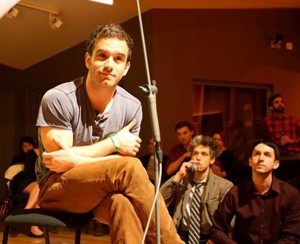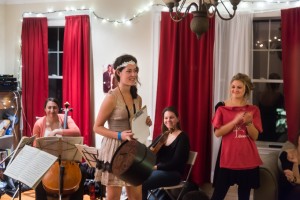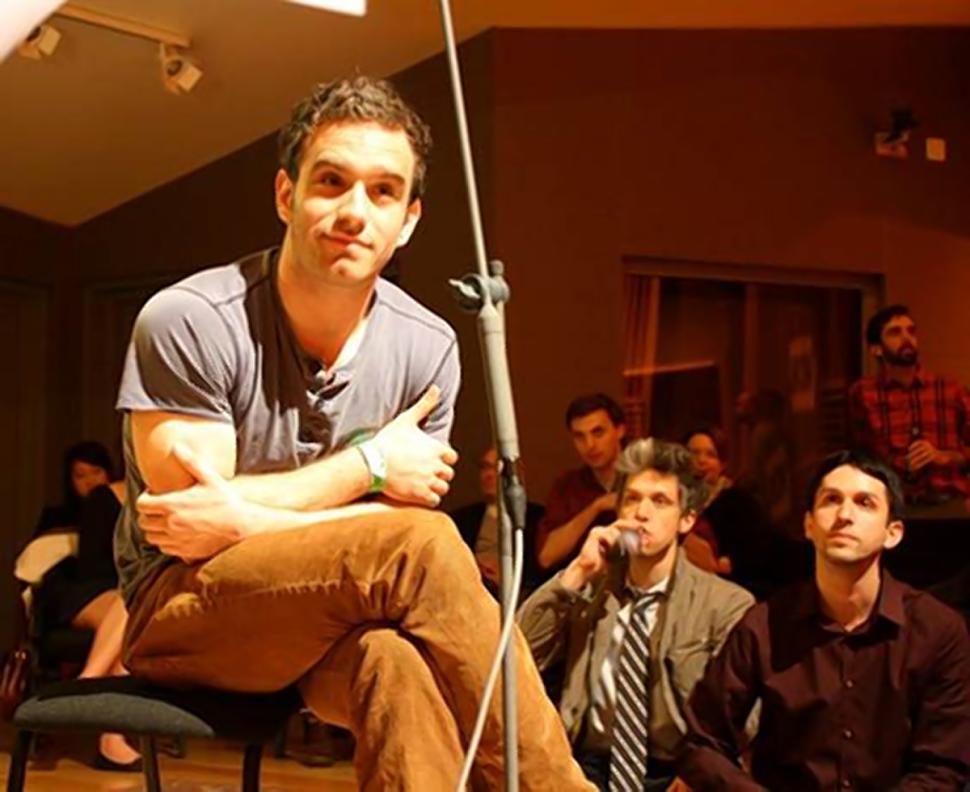Meet Sam Bodkin: Founder of Groupmuse
Hey everyone! ThatViolaKid here! I hope everyone has had a wonderful start to their year–I know I have!
My past few posts have begun to tackle the issue of Classical Music’s relevance in modern-day society and I want to keep that conversation going!
While going to school at Juilliard, I’m meeting wonderful people on the front lines of Classical Music who are confronting this issue head-on with BOLD and innovative ideas! One of those people is Sam Bodkin!

Sam Bodkin is the founder of an organization called Groupmuse that brings Classical chamber music to the living rooms of regular people! When I learned about this organization, I told everyone I knew about it! As I was trying to explain it in my own words, I could hardly do it justice!
Fortunately, I was able to meet Sam in person at my very first Groupmuse! After spending some time talking with him and picking his brain, it became clear to me that this guy is nothing short of a visionary!
Enough with “my” words! I called Sam for an interview and he cordially agreed to take time out of his busy schedule to talk to me! Mind you, everything he says in this interview is during his workout at the gym! Insane!
INTERVIEW
D: Hey Sam, this’ll be super quick and super simple. I’ve got just a few questions! The first one is, man, I love what you’re doing with Groupmuse, and I wanted to know: what is your musical background?! Have you played any instruments?
S: The truth is, I started taking piano in 2nd grade, but I stopped when I turned twelve because I wasn’t practicing. I basically wanted to be cool, and I didn’t think that playing piano was getting me there, so I picked up guitar. I played rock guitar pretty seriously until I discovered Classical Music when I was nineteen years old. Since then, I’ve lost interest in playing guitar and haven’t really played it since. So, I had a BIT of musical training, but the problem for me was that I didn’t have any appreciation for the art form itself. I saw music as more of a social and identity outlet, and I didn’t think that Classical Music gelled with the person I wanted to be when I was twelve. By the time I was nineteen, I didn’t really care about identity groups as much, and I simply liked what I liked. I got really serious and intellectually curious about music when I discovered Classical. It was a Beethoven String Quartet: The Grosse Fugue. And then, within a few months, classical had just kinda become my everything. Since then, I am what you would describe as…almost like a clinical fanatic. I spent all my time learning about Classical Music history I listened to tons and tons of music ALL the time. And I also tried to read along with the scores, even though I could barely read music myself. So, ya know, I’m just a nutjob when it comes to music. (laughter)
D: That’s fantastic man! Can you tell me a bit more? What was that turning point for you when discovered Classical Music and wanted to be a part of it?
S: Well, what it was, in bands I wrote songs. I was obsessed with the Beatles, and then I heard Beethoven’s Grosse Fugue because my best friend (he’s a cellist) was working on it with his String Quartet. We grew up together. The Grosse Fugue was by Beethoven, and I mean, Beethoven was someone I’d heard of, but I didn’t know ANYTHING about him. And I didn’t know anything about Classical Music. As far as I was concerned, it was music that was important because important people said it was important. It had nothing to do with me or my life. And because I felt this way, the Grosse Fugue was a radical departure from anything that I had preconceived Classical Music to be. It was so dense, gnarled, and sort of expressive, but also just feverishly…it was just like a nightmare (laughter). And I remember very distinctly the main theme explodes into a million different directions and then at one point, about 7 minutes into the piece, everything settles down and this melody shines through [he sings the theme from memory]. And I remember when that melody shined through. I was thinking to myself “Wow, that is sooooo beautiful. What is that?” So I kept listening to the piece because I couldn’t wait to get to that melody. And in the context of the chaos and insanity that came before and after it, it provided such a powerful contrast. Eventually, I just began to listen to it more and more—like 10 times a day. Then eventually, the chaotic madness started making more sense to me. And at that point, something was forever switched in my brain, and nothing ever sounded the same again. So I went to the library, began taking random stuff off the shelf. I’m like “OHH Schubert, I’ve heard of that guy, I think. Brahms…he did that lullaby, right?” So, I was just taking stuff off the shelf and I just slowly started exploring on my own terms. The next piece I fell madly in love with was Schubert’s last piano trio—especially the 2nd movement—which just BLEW my mind. And from that point forward, I was a convert. Everything was good, and honestly, to this day I haven’t stopped exploring.

D: Wow, see, that’s what I really love about your story: you didn’t grow up with Classical Music in your life, and you’ve learned to love it! So, why do you think Classical Music matters? Why would you go through so many lengths to create a program that would engender a resurgence of Classical music? Why is that important?
S: Because Classical Music is an inherently mysterious phenomenon. This music without words in it’s most abstract form of expression can be deeply evocative and can elicit emotional responses in [humans] that we just don’t understand. It crucially reminds us of the mysteries of human existence in a world where we are perpetually being put into this demographic or that demographic. Everything is sort of broken down into these analyzable numbers. I think that Classical music reminds us of the fundamental mystery of existence. It puts us in touch with that part of ourselves that cannot be known or categorized. I think that it’s extremely important if we are to have a healthy society and a healthy world of individuals. Music is appreciation of ourselves as mysterious, unknowable beings. I feel that the foremost of great art has the power to do that.
D: So, what exactly is Groupmuse? What’s it’s mission?
S: The Groupmuse mission is twofold. One, it’s to resuscitate the role that Classical Music plays in contemporary culture—to make it more accessible through a more demystified experience. The second mission, which is JUST as important, is to create plentiful and convenient opportunities for communities to gather in the real world to share something beautiful and profound with one another. The way it accomplishes that goal is that it’s a social network that directly connects Classical musicians in the area to living rooms in the area so that a community can organically generate its own Groupmuses—social chamber music concerts. They’re hosted in living rooms and are semi-public. The host invites his or her friends and also other members of the Groupmuse community can RSVP.

When’s the last time you’ve seen this many college kids excited about Classical Music???
D: Do you think that Groupmuse can help abolish Classical Music’s image of inaccessibility? And if you think so, how will it do just that.
S: I do think so. Classical Music is saddled with these associations that really has nothing to do with the music itself: wealth, elitism, and the invisible structures and rules of concert hall etiquette. Those are the associations. As such, most people have just not engaged with the form that much. Their expectations are built on flimsy, tenuous ground. Ya know, they think of Classical Music as this fancy thing that’s for the elite because they have seen an old movie set in the 1700’s. Or they heard the music in a luxury car commercial. THAT is what these associations are based on. They’re so limited. If you give someone ONE night where they are three feet away from a string quartet playing Beethoven Razumovsky 1 or Shostakovich 8 and they spend the whole night intently listening, it is going to be so much more intense, emotional, and evocative than any sort or peripheral association that has accumulated in their minds over the years. I really believe you just need one kickass experience to completely wipe all that other stuff away forever. And so if you associate the experience of Classical Music with that awesome evening you had with great people and your mind was blown by music that was deeper than anything you’ve ever heard, I think that is really sufficient to change peoples’ perceptions forever. The fact is, even if we aren’t turning these folks into art aficionados and die-hard fanboys like myself (laughter), they won’t be able to deny that a Mendelssohn String Quartet is a beautiful thing. When you’re sitting three feet from a dynamic, varied, and complicated work—if you’ve got blood in your veins—you cannot deny what a miracle it is. You just can’t.
D: How many people do you think volunteer for your organization? Do you have an estimate?
S: The thing is, we’ve had well over 500 Groupmuses. So, we have at least that many folk who want to make their homes available. And then we have a LOT of people who have expressed a willingness to volunteer on behalf of the organization—nearly 100. But we don’t really make use of that many volunteers at one time because managing a volunteer team of that size is a LOT of work and we wouldn’t be able to do it well unless we had someone hired full-time—and we don’t have anyone to do that! So, instead, we have small teams of really committed folks, about 9.

I mean, look at those smiles!
D: Where does Groupmuse currently operate?
S: It is most active in Boston, New York, and San Francisco. It has usually between 5 and 7 performances a week in New York and Boston and between 3-5 a week in San Francisco. But we have 3 this week in Seattle, so Seattle is beginning to get involved too!
D: Where do you see Groupmuse in 5 years in terms of development and popularity?
S: Hopefully in five years, there’s an active and sustainable Groupmuse community in every major city in the United States—increasing internationally as well. Any city that has a population of Classical performers can support a Groupmuse community, and, of course, every major city DOES have a population of Classical performers. We intend on having an active and sustainable community. When I say sustainable, I mean where Boston is right now. Basically, we don’t recruit hosts in Boston anymore; we don’t recruit musicians. People just come forward as a host and musicians just come forward and want to play. And the audience just RSVPs to every event and it generates itself. I wanna have that in every major city!
D: For the people that will be reading this blog and will be hearing about Groupmuse for the very first time, how can they get started hosting or being a part of Groupmuse?
S: If you live in one of our major cities (Boston, New York, San Francisco, or Seattle), you can just go on groupmuse.com, and if you wanna host one, just click the black “Host” button and you’ll be set! The whole thing takes less than two minutes to fill out, and before you know it we will have matched you with musicians and people will start RSVP’ing to your event. If you wanna play, log into groupmuse.com and create a performers profile. Submit a youtube link or two and then you will get approved by a groupmuse admin. After you’re approved you can log on and start offering to play at events! That’s all there is to it!
Man, it’s people like Sam that really help me keep hope alive for our art form! I really hope you enjoyed the interview! If you want to learn more about Groupmuse and how to get involved be sure to visit their website at groupmuse.com.
Until next time!
-TVK


